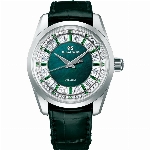Not comparing cars and watches; only apples/oranges to apples/oranges.
Just to examine the purchase cost and maintenance expenses of Japanese watches/cars to the same from European manufactures.
My experience;
Have had several high end German/Swedish cars and Swiss watches, relative to Japanese cars/watches they (generally);
1. cost more to buy
2. are more satisfying to drive/wear
3. have more cachet
4. need more frequent and expensive maintenance
5. will sometimes last longer and (watches) can become heirlooms
6. are not DIY friendly
7. cars/watches sometimes can be collectable
Japanese cars;
1. cost less
2. are less complex
3. Sometimes can be maintained by DIY
4. Watches are usually reliable, reasonably accurate and almost never need servicing.
5. Watches are rarely collectable
My experiences only. What are yours? /
/
Just to examine the purchase cost and maintenance expenses of Japanese watches/cars to the same from European manufactures.
My experience;
Have had several high end German/Swedish cars and Swiss watches, relative to Japanese cars/watches they (generally);
1. cost more to buy
2. are more satisfying to drive/wear
3. have more cachet
4. need more frequent and expensive maintenance
5. will sometimes last longer and (watches) can become heirlooms
6. are not DIY friendly
7. cars/watches sometimes can be collectable
Japanese cars;
1. cost less
2. are less complex
3. Sometimes can be maintained by DIY
4. Watches are usually reliable, reasonably accurate and almost never need servicing.
5. Watches are rarely collectable
My experiences only. What are yours?

